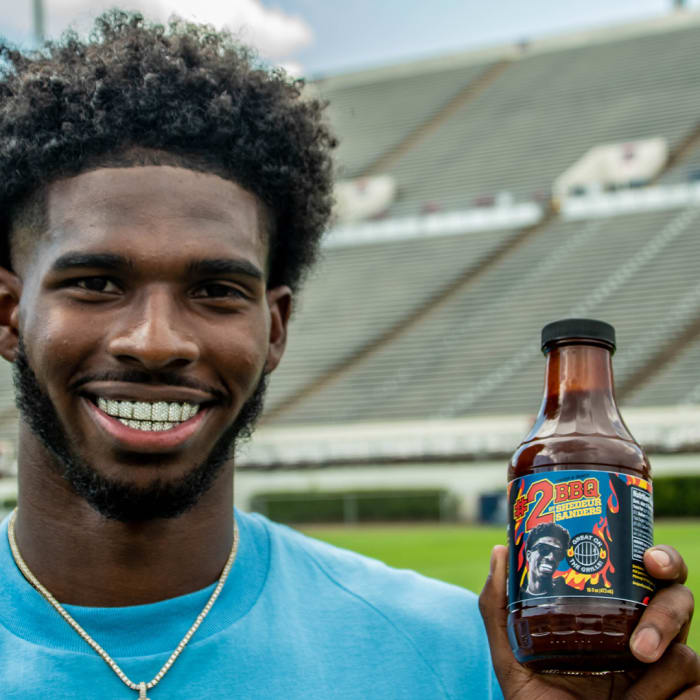
SHEDEUR SANDERS AND THE PRIME EQUITY ERA: REDEFINING ROOKIE CONTRACTS
Share
 Cleveland Browns rookie quarterback Shedeur Sanders could be igniting a trend for NFL quarterbacks who are transitioning from college, who made a name for themselves during the start of the name, image, and likeness era. Before his NFL career, Sanders took the NIL world by storm, partnering with some of the biggest brands in the industry, from Beats by Dre, Mercedes-Benz, Nike, and Gatorade, just to name a few.
Cleveland Browns rookie quarterback Shedeur Sanders could be igniting a trend for NFL quarterbacks who are transitioning from college, who made a name for themselves during the start of the name, image, and likeness era. Before his NFL career, Sanders took the NIL world by storm, partnering with some of the biggest brands in the industry, from Beats by Dre, Mercedes-Benz, Nike, and Gatorade, just to name a few.
One of the most valuable skills that collegiate athletes developed during the NIL era is the ability to not only pitch themselves to brands to market their products and services, but also to position themselves as owners. In addition to the brands that signed Sanders to NIL deals, he also established his own brand, SS2LEGENDARY, released music, and has an in-house media team, owned and operated by his older brother Deion Sanders Jr. Well Off Media, which is covering his journey on and off the field.

Moreover, Shedeur has taken the recipe that made him successful with NIL deals and is bringing that mindset to his NFL career. According to AS USA, Sanders included a prime equity clause in his rookie contract. Further this clause will allow Sanders to earn money from all of the revenue generated from promotions, merchandise, and sponsorships. Additionally, Shedeur will also profit from jersey sales, apparel, and slogans. His jersey sales alone have already reached $250 million, ultimately earning $14 million in commission.
In the current NFL structure, players can earn money from group licensing royalties, which NFL Players Inc manages. Instead of each player going out to make their own separate deals with trading card or video game companies, all players sign a collective agreement. This agreement gives companies the ability to use their names and faces collectively. The NFL Players Association manages these deals with companies like EA Sports for Madden or Panini for trading cards. The money generated is put into a large pot and then dispersed to the players who signed the agreement. What makes Shedeur’s prime equity clause so groundbreaking is that it goes beyond that shared pot, positioning him to get a direct cut of the revenue generated from his own merchandise, promotions, and brand identity. It is also worth noting is that Shedeur will also retain full ownership of his media content.
The Collective Bargaining Agreement standardizes NFL rookie contracts. The CBA dictates the length, signing bonuses, and salary. Moreover, there isn’t typically room in rookie contracts for innovative clauses. Instead of just earning from his base pay and endorsements, he will profit proportionally from merchandise and marketing tied to his personal brand. Shedeur’s prime equity clause marks one of the first times a professional athlete has direct equity implemented into his first professional contract.
Legal Scholars such as Taylor P. Thompson have observed that NIL frameworks will help reshape the framework for sports law, reframing athletes not as employees but instead independent brand partners with ownership stakes in their image and revenue (Thompson, Iowa Law Review, 2023). The prime equity clause is an example of this, giving Sanders his access to merchandise and sponsorship revenue, ultimately giving context to the conversations around the athlete and employer relationship in modern sports.
Sanders’ approach shows how the NIL era prepared athletes to think beyond paychecks and toward ownership. By founding SS2LEGENDARY, releasing music, and working with Well Off Media, he treated his brand like a business long before he was selected as the 144th pick in the NFL Draft. That mindset of ownership is now reflected in his prime equity clause, which mirrors trends from the 2024 Sponsors United NIL Report showing equity stakes in apparel, energy drinks, and lifestyle products as the fastest-growing deals.
.png)
Yet this innovation comes with questions: will other rookies have the leverage to negotiate similar terms, or is this unique to Sanders’ profile as Deion Sanders’ son and a national media figure? Equity carries risk—if sales slow, his returns shrink compared to a guaranteed bonus. As AP News notes, leagues are still balancing the tension between collective models and individualized profit (AP, 2023). Regardless, Sanders’ deal is historic, reframing an NFL contract into a business partnership model where players are treated as shareholders in their own brand, potentially marking the beginning of a broader “Prime Equity Era” in professional sports.
Sincerely,
Ray Saturn
Works Cited
ESPN Staff. (2020, March 15). NFL CBA approved: What players get in new deal, how expanded playoffs and schedule will work. ESPN. https://www.espn.com/nfl/story/_/id/28901832/nfl-cba-approved-players-get-new-deal-how-expanded-playoffs-schedule-work
NFL Players Association. (n.d.). What is the Group Licensing Agreement (GLA)? NFLPA. https://nflpa.com/the-group-licensing-assignment-gla
Bubel, J. (2025, August 8). The groundbreaking clause in Shedeur Sanders’ rookie deal that’s rewriting the rules. AS USA. https://en.as.com/nfl/the-groundbreaking-clause-in-shedeur-sanders-rookie-deal-thats-rewriting-the-rules-n/
Thompson, T. P. (2022). Maximizing NIL rights for college athletes. Iowa Law Review, 107(3), 1347–1368. https://ilr.law.uiowa.edu/print/volume-107-issue-3/maximizing-nil-rights-for-college-athletes
Carey, M. (2025, May 12). Contracts? Buyouts? Study at 1 school, play for another? Ambitious pitches to revamp college sports. AP News. https://apnews.com/article/ncaa-nil-buyouts-5f7008a63c974ec1a3b09e9f99ed12b9
2024 NIL Sponsors United Report. Sponsors United, 2024.
